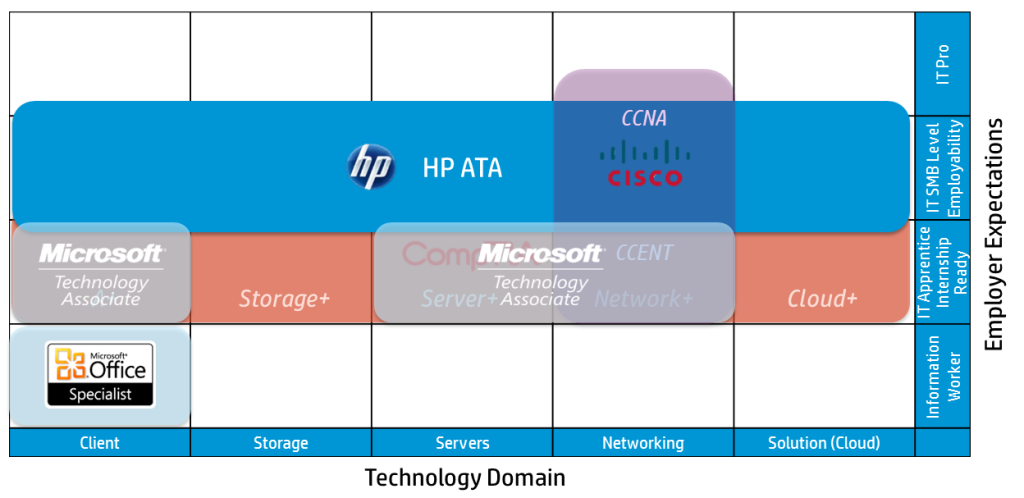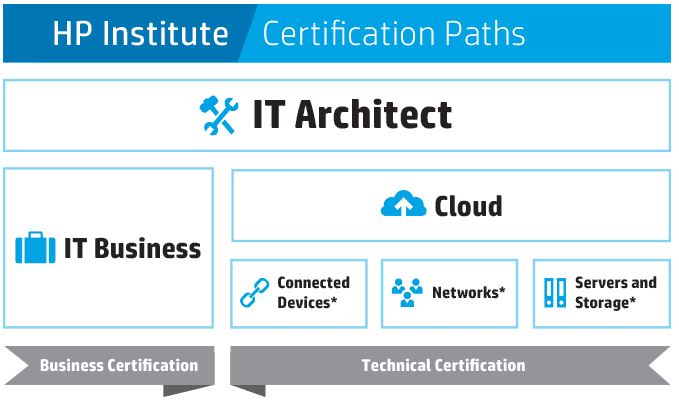The need for the HP ATA
The entry level certification market is awash with a range of programmes and up until 2010 the industry was dominated by the CompTIA A+ and its associated “Plus Series”.
Vendor neutral is a very important approach when starting off your IT career – it’s all about “applying your knowledge to unfamiliar situations”. Hence an over-reliance on a particular vendor’s technology can be dangerous when moving up the career ladder. However, in the current age where vendors are on a refresh cycle of 3 years, the vendor neutral market is struggling keep up the demands of new-entrants. Hence the MTA became so successful. With the approach of concentrating on universal accepted concepts combined with a Microsoft flavour, the MTA was a guaranteed success.
Although, critics of the MTA were quick to point out that it didn’t cover hardware and relied upon candidates to memorise facts and figures just like the A+. It didn’t feel as if it added anything new or injected fresh ideas in the battle for young minds. With such a gap in a market it was only a matter of time that a vendor took the bold move of stepping in. Enter the HP Accredited Technical Associate – ATA for short.
HP have a whole array of certifications and pathways designed to validate the knowledge of their accredited engineers – simply put they have been doing exams and courseware for a long time. However, it had been limited to product specific training. Once upon a time, HP used to (and in some cases still do) recommend that candidates coming on to their courses have at least the CompTIA professional series of exams.
The release of the ATA was an interesting decision from HP as it put them in the same boat as the CompTIA Plus Series, MTA and Cisco IT Essentials. However, HP were looking beyond that level. They had identified that with the ever increasing technology divergence and the positioning of current certifications, there was a big jump from the entry to expert level. So the HP ATA was designed to get candidates from zero to that middle ground so that the next level jump wouldn’t be so great.
Here is a graphic of what HP are trying to do:
They partnered with Certiport as the exam delivery vendor which has famously brought professional certifications to academia (and incidentally also offer the MTA, CompTIA Strata and MOS exams)
The strategy for HP is that they are not focussing on the school market but more college and university level. Indeed their certification pathway for the HP ATA is a lot more rigorous. Simply put you need to pass the Connected Devices, Networking and the Server & Storage Exams before the Cloud exam is unlocked. You can also elect to take the IT for Business exam which is an excellent standalone exam but when combined with the technical ones, gives you the IT Architect designation:
Sounds too good to be true, right? Well, yes. The exams are TOUGH. They definitely sit well above the CompTIA and MTA exams. There is an emphasis on being able to interpret a lot of text and working out appropriate solutions. If that wasn’t bad enough, the time allowance is meagre. If there are 50 questions, you get 50 minutes. At a rate of a “mark a minute”, your reading, comprehension, recall and problem solving skills have to be second to none. The pass mark: 70% – so not too crazy but its going to be tough for your students to hit that mark.
If that has put you off, don’t be. The HP ATA exams aren’t designed for the 16-21 market. Instead, they are for University undergraduates and graduates. The idea is that University students would study for 1 HP exam over the course of a semester. If you purchase a site license, in addition to the exams and practice exams, you get an equivalent number of soft copies of the HP ATA courseware. Be warned: currently you need Adobe Digital Editions to download/read them.
The Site License is another issue. You have to buy a separate site license for the HP IT for Business (1 exam) and a separate site license for the HP “Cloud Suite” (4 exams). So in essence, just to do the 1 extra IT for Business exam, you end up having to pay the same amount of money for your organisation to be able to do 4 exams! Now that is controversial. Hopefully, this could mean 2 things:
1. There are more exams coming for the IT for Business suite
2. HP will notice the lack of sales of the IT for Business license and merge it with the “Cloud Suite”
I’m hoping for number 2. My reasoning is that up until November 2013, HP were offering Remote Labs for the Networking, Servers & Storage and Cloud courses. These Remote Labs allowed up to 16 students (working in pairs) to access real HP kit in a remote data centre to understand concepts and experiment. The cost for each lab license was very close to the site license for the exams/courseware. Thus the HP ATA Remote Labs were discontinued and replaced by videos showing the lab concepts. In order to still allow for hands-on experience, HP are going to release the lab set-up configuration so institutions can create and manage it themselves.
HP are positioning the HP IT for Business for students currently studying Business Degrees – so in theory such departments will have the cash to invest in this. However, it still doesn’t feel quite right.
Given that the HP ATA programme is relatively new and hasn’t really ramped up (yet), its easy to be cynical. However, with high quality courseware, exams that focus on solutions, a site licence pack that has practice tests and allows for exam retakes, the programme is definitely one to watch for in 2014.
Still unconvinced? It’s part of HP’s Digital Agenda for Europe commitment: https://ec.europa.eu/digital-agenda/node/51281
Feel free to share your thoughts and comments!


